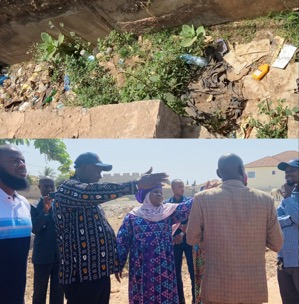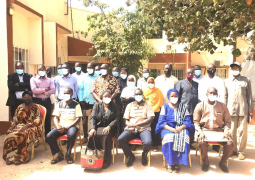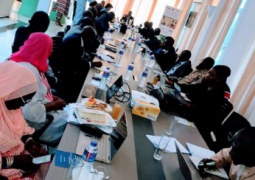
Rohey Jonh-Manjang made these remarks as she recently led a delegation comprising partners such as: National Disaster Management Agency (NDMA) National Environment Agency (NEA), Ministry of Works and National Road Authority (NRA) to flood-prone sites in the country.
“We need citizens to be patriotic and cease dumping waste at drainage holes, this act only blocks water ways which cause floods when rain falls heavily,” she stressed.
She explained that government is taking the lead to make sure that the infrastructure is resilient enough to withstand the pressure of climate change, however, citizens need to change their attitude.
“Every year before rainy season we engage in major cleansing exercise. However, the same exercise is repeated every year due to illegal waste dumping by people.”
The environment minister said that the site visit is to expose their sister organisations and ministries like NEA, NDMA, Physical Planning, Ministry of Works among others, to see the realities as well as put heads together and provide sustainable solutions to these problems.
She revealed that some houses in some areas have to go in order to redesign the drainage system, which she said, has begun already.
“We want to make sure that structures that obstruct waters ways are demolished.”
She called on law enforcement agencies to punish people that violate these laws to set examples and serve as deterrent. “This will help in addressing climate change for the long run.”
On his part, Massaneh Landing Ceesay, Specialist of the West Africa Coastal Action (WACA), a World Bank funded programme, explained that the project development objective is to make coastal regions resilient to climate change.
“In The Gambia, we are focused on addressing flood issues. We are currently working on removing wastes, sand dumps along the drainage ways that connect to the channel to make sure before the project ends and rain falls the country will not experience floods like the previous years.” he assured.
The flood-prone sites visited are; Jabang, Kotu, Brikama, Banjul, Jeshwang, and Abuko.




